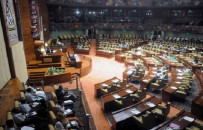Presidential reference verdict: President cannot appoint judges, says SC
Supreme Court says he only has ceremonial role.

File photo of President Asif Ali Zardari. PHOTO: REUTERS/ FILE
The president of Pakistan has no discretion or mandate to send the name of a nominee for reconsideration which has already been recommended by the judicial commission and confirmed by the parliamentary committee, the Supreme Court declared on Thursday.
Announcing its verdict in the Islamabad High Court (IHC) judges’ appointment case, the apex court ruled that in view of Article 175A of the Constitution, the president’s role in appointing judges was “nominal and ceremonial” and the judicial commission alone was responsible to determine seniority of the judges in question.
In its 102-page order, the country’s top court noted that neither the Constitution nor any law authorised the president, who is a symbolic appointing authority, to decide the seniority of judges.
The bench, which had reserved its judgement on December 21, 2012 on the presidential reference seeking advice on judges’ appointment, said that any such move by the president was not only against the principles of an independent judiciary, it also violated Article 175(3) of the Constitution which ensures the separation of the judiciary from the executive.
Earlier, the bench had ordered appointment of Anwar Kasi as the IHC chief justice as per the previous directions of the Judicial Commission on Judges’ Appointment. However, Justice Ejaz Afzal Khan had objected to the appointment of Kasi and suggested the name of Justice Riaz Ahmed Khan in a separate note.
And President Asif Ali Zardari had sought clarity on his role in the appointment of judges through a reference, which was filed by the law ministry.
On Thursday, Justice Ejaz Afzal Khan, in his lengthy additional note, observed that the Constitution as well as the oath of the president’s office showed that before appointing a person, a judge or a chief justice of a high court or a judge of the Supreme Court, the president shall ensure that his nomination is in accordance with the Constitution and the law. “He shall not appoint a person, a judge or a chief justice of a high court or a judge of the Supreme Court, if his nomination does not conform to the Constitution.”
He added that in case of a deadlock, the court’s decision will be considered final.
Regarding the seniority of judges, Justice Ejaz stated that it was the chief justice of the respective high court who should determine seniority of the judges. “It is, then, the judicial commission nominating the most senior judge for appointment... The president in this scheme does not figure anywhere,” he said.
“It is, however, a fact well worth remarking that seniority in this case has been determined by the chief justice of the IHC and that Justice Riaz Ahmed Khan, being senior in age, has already been declared the most senior Judge of the high court.”
Justice Khilji Arif Hussain, author of the judgement in the presidential reference, stated that the president was bound to take advice of the prime minister in appointing the chief election commissioner, caretaker prime minister, chairman of the Public Service Commission and chief of the armed forces.
The verdict stated that the commission, which was assigned the function of nominating the names of candidates for appointment as the chief justices of high courts and judges of the superior courts by taking in consideration their legal competency etc, who meet the minimum qualification provided by Articles 177(2) and 193(2) of the Constitution, had no mandate to decide the seniority of judges.
“On having dilated upon the questions referred to by the president and the opinion recorded hereinabove, we are of the opinion that Justice Riaz Ahmad Khan is the senior most judge of the IHC,” the verdict declared.
Published in The Express Tribune, February 1st, 2013.



















COMMENTS
Comments are moderated and generally will be posted if they are on-topic and not abusive.
For more information, please see our Comments FAQ